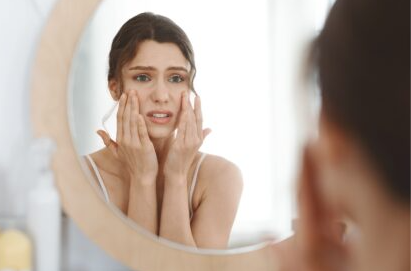
How does stress affect the skin and how to manage it
- 0
Stress can have a significant impact on your skin, contributing to various skin conditions and affecting its overall health and appearance. Here are some ways in which stress can affect your skin:
- Acne Breakouts: Stress triggers the release of stress hormones like cortisol, which can increase oil production in the skin. Excess oil, along with dead skin cells and bacteria, can clog pores and lead to acne breakouts. Stress can also worsen existing acne conditions and delay their healing process. To get help with acne, visit a dermatologist like Dr. Tariq Zaman.
- Skin Irritation and Sensitivity: Stress can weaken the skin’s natural barrier function, making it more prone to irritation and sensitivity. It can cause redness, itching, and inflammation, particularly in individuals with conditions like eczema, psoriasis, or rosacea.
- Premature Aging: Chronic stress can accelerate the aging process, leading to the appearance of fine lines, wrinkles, and dull skin. Stress hormones can break down collagen and elastin, which are essential proteins for maintaining skin elasticity and firmness. As a result, the skin may appear saggy and lose its youthful glow.
- Skin Dryness: Stress can disrupt the skin’s moisture balance and impair its ability to retain moisture. This can result in dry, flaky skin, making it prone to irritation and discomfort. Dry skin can also exacerbate the appearance of fine lines and wrinkles.
- Impaired Skin Healing: Stress can slow down the skin’s healing process. When under stress, the body directs its resources towards managing stress, which can hinder the skin’s ability to repair itself from wounds, cuts, or other skin injuries. This can lead to delayed wound healing and increased risk of infections.
- Hair and Scalp Issues: Stress can also affect the health of your hair and scalp. It may contribute to hair loss, thinning, or excessive shedding. Stress-induced hair-pulling disorders like trichotillomania may also occur. Additionally, stress can trigger scalp conditions such as dandruff or exacerbate existing conditions like seborrheic dermatitis.
- Unhealthy Habits: When stressed, individuals may engage in unhealthy habits that can further impact their skin. For example, some people may turn to comfort foods high in sugar and unhealthy fats, which can contribute to skin issues like acne. Others may develop habits like nail-biting, face-picking, or excessive rubbing, which can damage the skin.
How to manage stress for healthier skin
Managing stress effectively is essential for maintaining healthy skin. Here are some strategies to help reduce stress and promote skin well-being:
- Practice Stress Management Techniques: Engage in stress-reducing activities such as meditation, deep breathing exercises, yoga, or mindfulness practices. These techniques can help calm the mind and relax the body, promoting overall well-being and healthier skin.
- Maintain a Healthy Lifestyle: Eat a balanced diet, exercise regularly, and get sufficient sleep. These lifestyle factors can help manage stress levels and improve skin health.
- Establish a Skincare Routine: Stick to a regular skincare routine that includes gentle cleansing, moisturizing, and protection from the sun. Choose skincare products suitable for your skin type and avoid harsh ingredients that can further irritate or dry out the skin.
- Seek Support: Share your feelings and concerns with trusted friends, family, or a therapist. Talking about your stress can provide emotional relief and help you find effective coping strategies.
- Engage in Relaxing Activities: Find activities that help you relax and unwind, such as taking a bath, reading a book, listening to music, or spending time in nature. Engaging in hobbies and activities you enjoy can reduce stress and promote a healthy mind-skin connection.
Managing stress is important not only for your skin but also for your overall well-being. By adopting stress-reducing practices and taking care of your skin, you can minimize the negative effects of stress and maintain a healthy, radiant complexion. To get help with skin problems you can consult a dermatologist.

